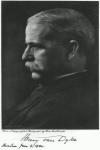An Ode for the Farmer's Dinner, University Club, New York, January 23, 1913
All hail, ye famous Farmers!
Ye vegetable-charmers,
Who know the art of making barren earth
Smile with prolific mirth
And bring forth twins or triplets at a birth!
Ye scientific fertilizers of the soil,
And horny-handed sons of toil!
To-night from all your arduous cares released,
With manly brows no longer sweat-impearled,
Ye hold your annual feast,
And like the Concord farmers long ago,
Ye meet above the Bridge below,
And draw the cork heard round the world!
What memories are yours! What tales
Of triumph have your tongues rehearsed,
Telling how ye have won your first
Potatoes from the stubborn mead,
(Almost as many as ye sowed for seed!)
And how the luscious cabbages and kails
Have bloomed before you in their bed
At seven dollars a head!
And how your onions took a prize
For bringing tears into the eyes
Of a hard-hearted cook! And how ye slew
The Dragon Cut-worm at a stroke!
And how ye broke,
Routed, and put to flight the horrid crew
Of vile potato-bugs and Hessian flies!
And how ye did not quail
Before th' invading armies of San José Scale,
But met them bravely with your little pail
Of poison, which ye put upon each tail
O' the dreadful beasts and made their courage fail!
And how ye did acquit yourselves like men
In fields of agricultural strife, and then,
Like generous warriors, sat you down at ease
And gently to your gardener said, Let us have Pease!
But were there Pease? Ah, no, dear Farmers, no!
The course of Nature is not ordered so.
For when we want a vegetable most,
She holds it back;
And when we boast
To our week-endly friends
Of what we'll give them on our farm, alack,
Those things the old dam, Nature, never sends.
O Pease in bottles, Sparrow-grass in jars,
How often have ye saved from scars
Of shame, and deep embarrassment,
The disingenuous farmer-gent,
To whom some wondering guest has cried,
How do you raise such Pease and Sparrow-grass?
Whereat the farmer-gent has not denied
The compliment, but smiling has replied,
To raise such things you must have lots of glass.
From wiles like these, true Farmers, hold aloof;
Accept no praise unless you have the proof.
If niggard Nature should withhold the green
And sugary Pea, welcome the humble Bean.
Even the easy Radish, and the Beet,
If grown by your own toil are extra sweet.
Let malefactors of great wealth and banker-felons
Rejoice in foreign artichokes, imported melons;
But you, my Farmers, at your frugal board
Spread forth the fare your Sabine Farms afford.
Say to Mæcenas, when he is your guest,
No peaches! try this turnip, 'tis my best.
Thus shall ye learn from labors in the field
What honesty a farmer's life may yield,
And like G. Washington in early youth,
Though cherries fail, produce a crop of truth.
But think me not too strict, O followers of the plough;
Some place for fiction in your lives I would allow.
In January when the world is drear,
And bills come in, and no results appear,
And snow-storms veil the skies,
And ice the streamlet clogs,
Then may you warm your heart with pleasant lies
And revel in the seedsmen's catalogues!
What visions and what dreams are these
Of cauliflower obese,
Of giant celery, taller than a mast,
Of strawberries
Like red pincushions, round and vast,
Of succulent and spicy gumbo,
Of cantaloupes, as big as Jumbo,
Of high-strung beans without the strings,
And of a host of other wild, romantic things!
Why, then, should Doctor Starr declare
That modern habits mental force impair?
And why should H. Marquand complain
That jokes as good as his will never come again?
And why should Bridges wear a gloomy mien
About the lack of fiction for his Magazine?
The seedsman's catalogue is all we need
To stir our dull imaginations
To new creations,
And lead us, by the hand
Of Hope, into a fairy-land.
So dream, my friendly Farmers, as you will;
And let your fancy all your garners fill
With wondrous crops; but always recollect
That Nature gives us less than we expect.
Scorn not the city where you earn the wealth
That, spent upon your farms, renews your health;
And tell your wife, whene'er the bills have shocked her,
A country-place is cheaper than a doctor.
May roses bloom for you, and may you find
Your richest harvest in a tranquil mind.






